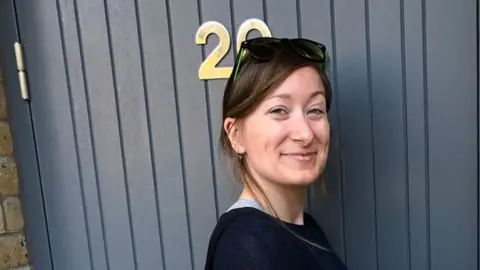Cladding rules: 'I would never have bought my flat if I knew'
 BBC
BBCNHS worker Holly Ciesielczuk bought 75% of her first-floor flat in Redbridge in March 2019, under shared ownership.
But when she tried to borrow more money to increase her share of ownership a year later, she hit a stumbling block.
Following their initial survey, her mortgage lender requested an EWS1 form, which can be obtained following an assessment of a building's external walls.
These were first developed to assess the potential financial impact of cladding on high-rise flats, after 72 people died at Grenfell Tower.
To begin with, only those who owned flats in tall buildings with dangerous flammable cladding were affected.
But after the government extended its advice to smaller properties in January 2020, mortgage lenders began demanding fire surveys from a much wider range of sellers.
The reason Holly was given by her lender for requesting one was that a balcony on the building had a wooden floor.
However, she says her housing association would not agree to an EWS1 because, it said, the building was not high enough to meet the criteria.
The lender refused a mortgage without it, as did the next bank she tried. The combination of this and her partner's cancer diagnosis took its toll.
"I properly broke down. If I knew how much stress this was going to cause, I would never have bought my flat," she told the BBC.
New guidance
In November, the government said an agreement had been reached with the Royal Institution of Chartered Surveyors (RICS), banking trade body UK Finance and the Building Societies Association.
It said this meant owners of flats in buildings without cladding would no longer need the form to sell or remortgage.
But mortgage lenders said they "did not consent" to the announcement.
Problems are still being encountered - including by Holly.
When she contacted her lender after the November announcement, their position had not altered. "I was so hopeful, so excited - but then so dismayed when I was told, 'You still need an EWS1 form.'"
Following a consultation on the requirement for EWS1 checks, RICS plans to release updated guidance. It's understood this could be published as soon as next week.
It will be aimed at narrowing down the number of EWS1 requests, but there's no obligation for lenders to follow it.
"Naively or optimistically, I hope the guidance will provide clarity about whether I will be able to get a mortgage," Holly says.

Even when building management agree to having checks done, it can be a lengthy process.
Alex Cross from Berkshire was excited to find what he thought was his "perfect" first flat, yet he too has been held up.
When he was asked to obtain an EWS1 form to secure a mortgage, the property management company refused to help.
They said they owned 4,000 blocks, but only 48 inspections had been booked that financial year.
"At that rate, it would take decades to obtain the required information," Alex points out.
He eventually found one bank that did not require the full survey, but asked a set of questions about the building's safety, which the property developer would not answer.
'Nightmare'
Rebecca Frisina and her family were hoping to move to a larger property, but have been unable to sell their flat. Although they have found a buyer, the mortgage provider has requested a EWS1 form for their property.
The management company which owns the freehold eventually agreed to pursue the safety checks. However, it isn't clear when they might take place.
Rebecca's family are now living with her parents and their buyer has moved into rented accommodation.
"We have asked for a rough estimated timeline and they have refused to answer us," she says. "It's been a nightmare."

Andrew Montlake is managing director of mortgage broker Coreco and chairman of the Association of Mortgage Intermediaries. He says one of the first things his team now ask about a property is whether there is cladding and whether an EWS1 has been produced.
"There are cases I'm sure where the buildings are probably OK. However, where you're dealing with such a serious subject, surely it's better to be safe than sorry. If the valuers aren't sure, they're going to cover themselves
"If there's a risk of a leaseholder having to pay repair bills in future, that could have an impact on affordability."
Lenders 'spooked'
UK Finance also pointed out that some buildings might have cladding that is not obvious.
The fee for an EWS1 survey can be up to £50,000, depending on the size and style of the property.
It's estimated that there are only 300 chartered fire engineers in the UK who can carry out the survey, which is believed to be a cause of delays.
A social media campaign, #EndOurCladdingScandal, has attracted support from a wide range of homeowners, including those subject to EWS1 requirements.
"RICS and the government can offer as much guidance as they want, but the truth is the genie is out of the bottle - and mortgage lenders are spooked," a spokesperson for the campaign said.
The Ministry for Housing, Communities and Local Government said in a statement: "The EWS1 is not a government form, nor a legal requirement, and we're disappointed this is being asked for in some cases where it's not needed.
"If a form is genuinely needed, we are providing £700,000 of funding to train up to 2,000 more surveyors to speed up the process and get through the backlog."
